

Industry 4.0 impact on management practices and economics (IN4ACT)
The objective of the IN4ACT project is to implement structural changes at the Kauno Technologijos Universitetas (KTU) School of Economics and Business through the opening of an ERA Chair in “Industry 4.0 Management and Economics” research, to increase research excellence, socio-economic impact, international reputation, and attractiveness to international talented researchers and students.
An ERA Chair holder and a team will be recruited to
1/ Implement an ambitious research agenda on the impact of future manufacturing (Industry 4.0) on management practices and economics;
2/ Drive changes at the KTU School of Economics and Business related with research management and human resources, especially to comply with the ERA priorities;
3/ Improve the School’s exploitation, dissemination, and communication capacities;
4/ Grow networks and increase links with stakeholders, especially to increase participation in Horizon 2020.
20th of June, 2023 15:00 - 17:00
KTU Library, Amphitheater, Studentų St. 48, Kaunas

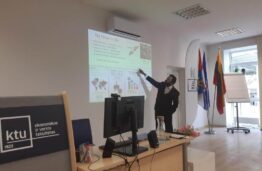
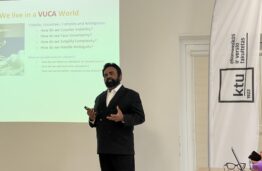

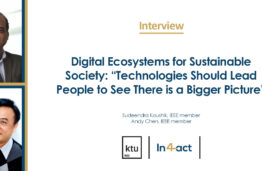


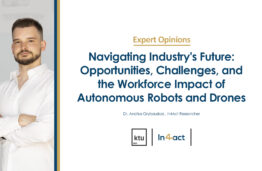
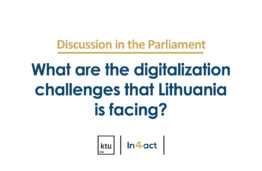

ERA Chair research strategy outlined in this document seeks to extend beyond traditional research and scientific disciplinary boundaries. On one hand, this involves the adoption of an interdisciplinary perspective transcending conventional forms of academic specialization; on the other, it demands sustained engagement with stakeholders and social actors beyond the boundaries of academia and research, i.e., systematic engagement with the worlds of business, civil society, and institutions of governance, policy and regulation and different levels of public administration. This is the methodological principle underlying the ERA Chair research strategy.
Framework for alignment between research strategy and smart specialization strategy lays out a set of thematic and operational areas in which IN4ACT can contribute to the objectives of Lithuania’s Research and Innovation Smart Specialization Strategy (RIS3). The document identifies a list of priorities to be addressed, along with short descriptions of outputs the ERA Chair team can produce that are relevant to the RIS3, and the modalities of engagement with the authorities responsible for the implementation of Lithuania’s RIS3 strategy. The main rationale of Deliverable D7.1 is to ensure maximum relevance of IN4ACT to Lithuania’s RIS3 strategy throughout the project’s life and sustained impact after the project’s completion.
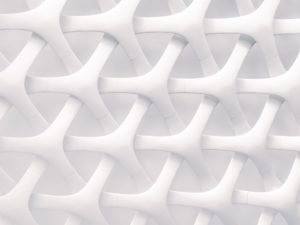

The IN4ACT Research Strategy in the New Historical Context
It is increasingly clear that our era will be defined as a fundamental pivotal point between two historical phases: the era before COVID-19 and a post-viral period of – as yet – largely undefined and uncharted contours. Today, leading academic, business, and policy circles and reasoned analysts seem to converge around an emerging consensus that we are entering an era where we will witness a dramatic restructuring of the economic and social order in which business and society have hitherto operated. At the same time, we are likely to see the rise of heated debate about what the so-called “new normal” could and should entail regarding the roles, rights, and responsibilities of all stakeholders and key actors in civil society, the state, and institutions of public governance.
In this context, the IN4ACT project sets out to map and evaluate the multi-faceted impact of COVID-19 on Industry 4.0
The objective of the IN4ACT project is to implement structural changes at the School of Economics and Business, Kaunas University of Technology (KTU) through the opening of an ERA Chair in “Industry 4.0 Management and Economics” research, to increase research excellence, socio-economic impact, international reputation, and attractiveness to international talented researchers and students.
Each specific objective is detailed below using the SMART objective framework:
| S | for specific | – What result will be delivered? |
| M | for measurable | – Which criteria define success? |
| A | for achievable | – Does KTU have the capabilities to attain the objective? |
| R | for realistic | – Are the conditions favorable to attain the objective? |
| T | for time-bound | – What is the time frame to attain the objective? |
To achieve its overall objective, the IN4ACT project will focus on seven specific objectives.
Objective 1Recruit an outstanding researcher to fulfil the ERA-Chair holder position and international talents to set up the ERA Chair team |
|
| S |
Result 1.1. Outstanding researcher recruited as ERA Chair holder through an open, transparent, and merit-based process applying the principles set in the European Commission’s Code of Conduct for the Recruitment of Researchers. Result 1.2. Interdisciplinary highly-skilled ERA Chair team members recruited through a process following the principles of the Code of Conduct. |
| M |
Success criterion 1.1. All principles and requirements of the Code of Conduct respected during the recruitment of the ERA Chair holder. Success criterion 1.2. All ERA Chair team members recruited through a process complying with all principles and requirements of the Code of Conduct. |
| A |
To attract the ERA Chair holder and the team members, the KTU School of Economics and Business provides an intellectually stimulating environment for research and education that allows proactive interdisciplinary projects with technology faculties and businesses, especially through the KTU National Innovation and Entrepreneurship Centre, which is a platform for business-academia collaboration. The school’s research performance is increasing, opening more to international collaborations and already recognised through publications in reputed journals and presentations in international conferences. The mobility at the school is also increasing and the number of international researchers joining the School is growing. Through the IN4ACT project, the School is also able to provide competitive salaries and benefits, working conditions, research perspectives, and international projects opportunities. KTU grants the project steering committee with the right and responsibility to recruit the ERA Chair holder through a Code of Conduct compliant process. Then, KTU grants the ERA Chair holder with the rights and responsibilities to recruit the team following principles and requirements of the Code of Conduct. |
| R |
The research orientation of the ERA Chair is relevant to all EU member states’ economies and societies, and future-oriented since it focuses on understanding and applications for dealing with the “future manufacturing” paradigm. It aligns both with the Lithuanian Smart Specialisation Strategy (S3) and with EU development priorities. Thus, the project is very relevant in terms of socio-economic impact and the possibility of raising research funding, societal engagement, and policymakers’ support. It is also a competitive position within the international economics and management research fora, allowing the ERA Chair holder to develop recognised expertise worldwide. The project proposal defines the ERA Chair holder and team recruitment conditions and requirements, which comply with the Code of Conduct. They will bind KTU with the European Commission through the Grant Agreement, ensuring the Code of Conduct is respected. |
| T |
|
Objective 2Improve the research management and human resources management processes and policies of the school |
|
| S |
Result 2.1. School’s recruitment and human resources management policies reviewed and updated so that they fully align with the European Charter for Researchers and the Code of Conduct for the Recruitment of Researchers. Result 2.2. Research performance monitoring system in place so that researchers and managers can set up objectives, review performance, implement training, and use resources objectively. |
| M |
Success criterion 2.1. All School’s recruitment and human resources management policies complying with the European Charter for Researchers and the Code of Conduct for the Recruitment of Researchers. Success criterion 2.2. Research performance monitoring system in place. |
| A | To establish the structural changes, KTU grants the ERA Chair holder and the project steering committee with the mission to update the School’s policies in accordance with the Charter and Code of Conduct, and implement the changes. The ERA Chair holder will support the SMT (senior management team) the development of the new research performance monitoring system throughout the whole school. |
| R | It is already an institutional and national objective for KTU and Lithuania to adopt the conditions and requirements of the Charter and Code of Conduct. The project is an opportunity to achieve this goal. Lithuania assesses its higher-education and research institutions’ performance through its agency MOSTA. The agency encourages better research performance monitoring systems implementation. |
| T |
|
Objective 3Develop an excellent, multidisciplinary and internationally competitive research agenda and strategy in Industry 4.0 management and economics research |
|
| S |
Result 3.1. Research strategy in Industry 4.0 management and economics developed independently by the ERA Chair holder. The strategy defines the research priorities in accordance with ERA priorities and Lithuanian Smart Specialisation Strategy (S3), and a 5-year roadmap of the research objectives defined using the SMART framework (including key performance indicators). Result 3.2. Optimised School usage of infrastructure and equipment, and implementation of a plan addressing shortage or underuse, in accordance with the research strategy. Result 3.3. Training and mentoring programme for the ERA Chair team covering technical and transversal knowledge and skills and aiming at achieving the best fit between the team’s research strategy and knowledge and skill set, while addressing individual career development wishes. Result 3.4. Presentations in selective conferences and articles published in top-tier journals to increase the School’s H-index, and in open-access journals to increase research results dissemination. The balance between the two publishing routes will be based on the objectives and KPIs of the research strategy. Result 3.5. Reviewed School’s doctoral training in accordance with the research strategy and alignment with the European Charter for Researchers. Result 3.6. Spill-over effect of the ERA Chair structural changes to other KTU faculties by the active promotion of the changes to other KTU deans by the ERA Chair holder. |
| M |
Success criterion 3.1. Research strategy produced with a 5-year roadmap of SMART objectives aligned with ERA and Lithuanian S3 priorities and KPIs and targets. Success criterion 3.2. Improvement of the School’s equipment (operation cost / usage rate) ratio over the duration of the project. Ratios reviewed for all types of equipment at the beginning of the project and plan to optimise them (e.g. by renting underused equipment, replacing equipment with too high maintenance time with more efficient ones, changing operational procedures to reduce idle time etc.) Success criterion 3.3. All ERA Chair team members have a technical and transversal skill development assessment performed by six months after they start their positions, and receive at least one technical and one transversal training per year. Success criterion 3.4. Increase in the average H-Index of the School. Success criterion 3.5. School doctoral training incorporating the ERA Chair research agenda and complying with the European Charter for Researchers. Success criterion 3.6. Structural changes promoted to all KTU deans by the end of the project. |
| A |
The ERA Chair holder will be given autonomy to develop and implement her Chair’s research strategy. She will work in an institution with a strong interaction with business partners, be integrated within a sizable School to complete the expertise of her team, be involved in a dynamic school, and have access to technology experts in the other KTU departments. The ERA Chair holder will be supported by the KTU Research and Innovation Competence Centre affiliated with the Central Office of the University, to provide training to the ERA Chair Team. This centre manages a range of training and development programmes. The ERA Chair research focus integrates well in the current portfolio of study programmes and can easily host PhD students. The ERA Chair holder will receive support from the central office of KTU to liaise with other KTU faculties deans to discuss about the structural changes that can be implemented following the model of the ERA chair. |
| R |
Future manufacturing is a strategic economic priority in Lithuania. The Lithuanian S3 has one priority in new production processes, materials and technologies. The ERA Chair will provide valuable knowledge to contribute to this S3 priority. It will also benefit from the strong connexion that KTU has with businesses through the Santaka Valley programme1. Santaka Valley is a thematic innovation cluster linking businesses, education and research institutions. KTU is actively involved in it by hosting the National Innovations and Entrepreneurship Centre, which works as a one-stop shop for businesses to access research and education services. The Schools of Economics and Business is highly involved in this centre. Thus, the ERA Chair will receive a strong support from the business community and policy makers in Lithuania. |
| T |
|
Objective 4Increase international mobility of researchers |
|
| S |
Result 4.1. Strategy for international, cross-disciplinary and inter-sectoral networks and cooperation developed and implemented. Result 4.2. Bilateral working visits to and from academic partners held. Result 4.3. Research secondments organised between the ERA Chair and partners. |
| M |
Success criterion 4.1. Strategy for international, cross-disciplinary and inter-sectoral networks and cooperation produced. Success criterion 4.2. Bilateral working visits to academic partners organised at least once a year. Success criterion 4.3. All research ERA Chair staff members on secondment at least one month per three years and equivalent number of person months of visiting researchers hosted at KTU. |
| A | The ERA Chair holder will benefit from the existing network of partners of the KTU School of Economics and business as a starting base for network development. The School is especially strong in partnering with businesses. It also implements targeted activities to join global research networks and involve a growing number of international scholars within its teams. |
| R | The ERA Chair holder will have access to national partners through the Santaka Valley. To access international partners, the ERA Chair will get involved in the international global research networks that KTU has developed: European Foundation for Management Development (EFMD), Chartered Institute of Marketing, GLORAD independent research network, European Consortium of Innovative Universities (ECIU) and similar networks. |
| T |
|
Objective 5Improve the school’s capacities in dissemination and communication of research results |
|
| S |
Result 5.1. Raised awareness of the management and economics aspects of the Industry 4.0 paradigm by stakeholders (businesses, administrations, policymakers). Result 5.2. Transfer of knowledge in Industry 4.0 management and economics to local and global business, academic, and policy partners. |
| M |
Success criterion 5.1. Awareness-raising information transmitted to a target number of stakeholders via channels defined in a dissemination and communication plan and reviewed annually. Success criterion 5.2. Consulting services and commissioned or collaborative research with partners to transfer knowledge reviewed annually against targets. |
| A |
The ERA Chair will be an active contributor to Santaka Valley and provide awareness-raising measures and research and consulting services through the National Innovations and Entrepreneurship Centre, which will facilitate links with stakeholders, especially businesses. The KTU Central Office will help the ERA Chair with communication resources such as website design and management or promotion materials creation. |
| R | The transformation of manufacturing in Lithuania and the European Union is growing and strategic. To gain competitiveness, and at the same time address challenges of sustainability, the sector requires the knowledge and competencies that the ERA Chair will develop through the project. The socio-economic environment is therefore favourable to access the knowledge that the ERA Chair will produce. |
| T |
|
Objective 6Increase the school’s participation in international competitive research funding programmes, especially Horizon 2020 |
|
| S |
Result 6.1. Network of academic and business partners grown. Result 6.2. Higher number of proposals submitted to competitive research funding schemes as coordinator, especially Horizon 2020. |
| M |
Success criterion 6.1. Year-by-year growth of the share of private funding > 5%. Success criterion 6.2. Coordinator of at least 3 Horizon 2020 proposals per year. |
| A | The KTU School of Economics and Business already has a strong network of business partners. It is also growing its involvement in international initiatives and has an increasing number of collaborations with international research organisations. |
| R |
The research framework conditions in Lithuania have increased a lot recently to foster international collaborations and to ease the recruitment of talented international researchers. KTU is a leading university in the Baltic countries with a history of participation in Framework Programmes. Its size, education and research, infrastructure, and local networks constitute valuable contributions to Horizon 2020 consortia. By offering a combination of expertise in science and technologies, social sciences and humanities, and economics and business, KTU is able to significantly deliver quality research in Horizon 2020 projects. |
| T |
|
Objective 7Enhance the societal impact of the school’s research and the exploitation of its research results |
|
| S |
Result 7.1. Rules for alignment between ERA Chair strategy and Lithuanian Smart Specialisation Strategy produced and implemented. Result 7.2. ERA Chair holder contributor to Lithuanian Smart Specialisation Strategy community and in a position to defend researchers’ and research institution’s needs toward Lithuanian policymakers. Result 7.3. ERA Chair holder linking the School with international initiatives in Industry 4.0 research, policy, and promotion. |
| M |
Success criterion 7.1. ERA Chair research strategy priorities aligned with Lithuanian Smart Specialisation Strategy. Success criterion 7.2. ERA-Chair holder meeting with the Governing body of the Lithuanian Smart Specialisation Strategy once a year. Success criterion 7.3. School contributor of at least two international initiatives related to Industry 4.0. |
| A | KTU is a leading research and higher-education institution in Lithuania, which has been involved in the discussions leading to the creation of the Lithuanian Smart Specialisation Strategy by the Lithuanian Government. KTU is already actively contributing to the strategy, especially through the Santaka Valley. The ERA Chair’s activities will contribute to one of the Smart Specialisation Strategy priority “New production processes, materials, and technologies.” Alignment between the ERA Chair’s research strategy and Lithuania Smart Specialisation Strategy will, therefore, be straightforward. |
| R | KTU’s central office will facilitate the introduction of the ERA Chair holder to the Lithuanian Government office responsible for Smart Specialisation Strategy. The collaboration will be eased by the fact that the ERA Chair’s mission is already aligned with one of Lithuania’s Smart Specialisation Strategy priorities. |
| T |
|